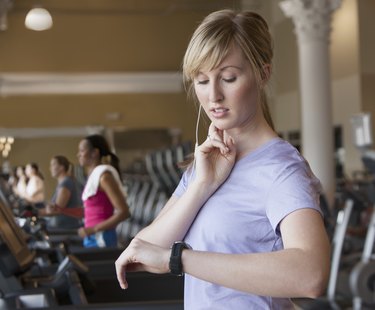
Your heart rate will naturally rise when you exercise and then lower once you stop. If your heart rate returns to its resting rate quickly after exercise, it's a sign of good cardiac health. However, if your heart rate drops too low, that could signal a cardiac issue.
Normal Heart Rate Ranges
Video of the Day
Your heart rate should change throughout the day based on your activity level. According to the American Heart Association (AHA), healthy adults have an average heart rate of 60 to 100 beats a minute. How fast your heart beats depends on factors such as:
Video of the Day
- Hormones
- Anxiety
- Stress
- Physical fitness level
- Medications
During exercise, your heart rate should rise. The AHA says to use your age to calculate your maximum and targeted heart rates during exercise. To figure out your max heart rate, subtract your age from 220. For example, if you're 20, your max heart rate is 200. Your max heart rate is the highest your heart should beat.
For moderate exercise, you should aim to have a heart rate that's 50 to 70 percent of your max heart rate. If you're 20, then, medium-intensity exercise should cause your beats per minute to be between 100 and 170.
However, these are estimated levels. Your heart rate range will vary based on your exact age and overall health.
After a workout, your heart rate should start to slow down. In fact, according to Mary Norey-Miceli, PT, DPT, a physical therapist for Kinnelon Medical and Wellness Associates in Kinnelon, New Jersey, the faster your heart rate slows to its normal range, the better your heart health is.
"Generally, after you stop exercising, your heart rate dropping back down to resting levels quickly is actually a sign of good heart health," she says.
But if your heart rate starts to drop during exercise, you will likely feel sick, lightheaded or dizzy.
"When the drop occurs during exercise, it could be a sign of overheating or dehydration," Norey-Miceli says. If this occurs, she suggests you stop exercising immediately. Elevate your legs and pump your ankles by pointing and flexing your toes. This will help blood return to your head and heart.
A Too-Low Heart Rate
In general, the lower your resting heart rate, the better. In fact, younger people and serious athletes tend to have lower resting heart rates than the average person. However, there is such a thing as having a heart rate that's too low. If you are not a serious athlete and your heart rate is below the normal range, you could have a condition called bradycardia.
Bradycardia is the medical term for a heart rate that is lower than the normal range. According to Harvard Medical School, if your heart rate is below 60 beats a minute, you have bradycardia. You may or may not have symptoms. But, according to the Mayo Clinic, potential symptoms that could signal you have bradycardia include:
- Chest pain
- Tiring quickly during exercise
- Fatigue
- Lightheadedness
- Shortness of breath
- Fainting or near fainting
- Dizziness
- Confusion or memory problems
See your doctor if you experience any of these symptoms, and seek immediate medical care if you have chest pain or trouble breathing that lasts for more than a few minutes.
Causes of Bradycardia
A range of medical issues can lead to bradycardia. According to the Mayo Clinic, common causes include:
- Complication from heart surgery
- Myocarditis (infection of heart tissue)
- Damage to heart tissue from a heart attack or heart disease
- Age-related damage to heart tissue
- Underactive thyroid
- Inflammatory diseases such as lupus or rheumatic fever
- Certain medications for high blood pressure or psychosis
- Obstructive sleep apnea
If one or more of these conditions exist, your heart is not transmitting electrical signals correctly, which causes your heart to beat irregularly or slowly.
According to Johns Hopkins Medicine, other underlying conditions can also cause you to have bradycardia. These include:
- Lyme disease
- Exposure to certain toxins
- High pressure within your skull
- Not enough oxygen in your blood
- Low body temperature
If you regularly notice your heart rate dropping during exercise, Norey-Miceli says you should stop what you are doing and schedule an appointment with your doctor to figure out what caused your heart rate to drop during your workout.
Read more: 11 Simple Ways to Keep Your Heart Healthy and Strong
- American Heart Association: “Know Your Target Heart Rates for Exercise, Losing Weight and Health”
- Mary Norey-Miceli, PT, DPT, physical therapist, Kinnelon Medical and Wellness Associates, Kinnelon, New Jersey
- Harvard Medical School: “Bradycardia”
- Mayo Clinic: “Bradycardia”
- Johns Hopkins Medicine: "Bradycardia"